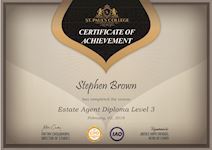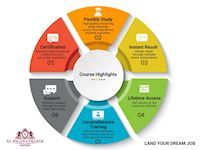Office Administration & Secretarial Diploma Level 3 and 4 - FREE Student ID Card
CPD & IAO approved training with tutor support I 140+ Modules I Lifetime Access I Exclusive Christmas Offer
St. Pauls College
Summary
- Tutor is available to students
Overview
Benefits of taking this Office Administration & Secretarial Diploma Level 3 and 4:
Certification: Internationally recognised certification upon successful completion.
Free Student ID: Get thousands of discounts at many places including cinemas, gym, local restaurants.
Flexible Study: High quality e-learning study materials, access from any device anytime anywhere
Instant Result: Instant result through multiple choice assessments
Lifetime Access: 24/7 access to the course for lifetime
Comprehensive Training: Delivered by instructors with industry experience, video lessons and texts.
Support: Premium support through live chat, email and phone
Whether you want to become thoroughly organised to play a dynamic role of an office administrator or a secretary and explore the formula to the steady operation of an organisation, then this Office Administration & Secretarial Diploma Level 3 and 4 course is the only thing you need.
By taking this course, you will understand how to coordinate and implement office procedures and fulfil the responsibility for any specific projects and tasks and gain commonly desired skills such as IT, organisational and presentation skills, Administrative support skills.
From preparing meetings, professional customer service skills, client communication, making arrangements, dealing with bills, collect specific and statistical data to control cash flow and manage accounts, and a variety of tasks related to organisation and communication, this course covers everything that you need to know for working in office environment.
*Student ID Card benefits*
- Use this as your official student identification.
- Get special discounts on further purchases at St. Pauls College.
- Thousands of UK discounts at many places including cinema, gym, libraries, local restaurants and many more (where accepted).
Course media
Description
What will you learn:
The Office Administration & Secretarial Diploma Level 3 and 4 course consists of 112 mandatory modules, covering
Admin Support
- Module One – Getting Started
- Module Two – Getting Organized (I)
- Module Three – Getting Organized (II)
- Module Four – Managing Time
- Module Five – Getting It All Done On Time
- Module Six – Special Tasks
- Module Seven – Verbal Communication Skills
- Module Eight – Non-Verbal Communication Skills
- Module Nine – Empowering Yourself
- Module Ten – The Team of Two
- Module Eleven – Taking Care of Yourself
- Module Twelve – Wrapping Up
Administrative Management
- Module One – Getting Started
- Module Two – Why Your Office Needs Administrative Procedures
- Module Three – Gathering the Right Tools
- Module Four – Identifying Procedures to Include
- Module Five – Top Five Procedures to Record
- Module Six – What to Include in Your Binder (I)
- Module Seven – What to Include in Your Binder (II)
- Module Eight – Organizing Your Binder
- Module Nine – What Not to Include in the Procedure Guide
- Module Ten – Share Office Procedure Guide
- Module Eleven – Successfully Executing the Guide
- Module Twelve – Wrapping Up
Organisational Skills
- Module One – Getting Started
- Module Two – Remove the Clutter
- Module Three – Prioritize
- Module Four – Scheduling Your Time
- Module Five – To Do Lists
- Module Six – Paper and Paperless Storage
- Module Seven – Organization in Your Work Area
- Module Eight – Tools to Fight Procrastination
- Module Nine – Organizing Your Inbox
- Module Ten – Avoid the Causes of Disorganization
- Module Eleven – Discipline is the Key to Stay Organized
- Module Twelve – Wrapping Up
Personal Assistant
- Module One – Getting Started
- Module Two – Working with Your Manager
- Module Three – Administrative Soft Skills
- Module Four – Effective Time Management
- Module Five – Meeting Management
- Module Six – Tools of the Trade (I)
- Module Seven – Tools of the Trade (II)
- Module Eight – Being an Effective Gatekeeper
- Module Nine – Organizational Skills
- Module Ten – Confidentiality Guidelines
- Module Eleven – Special Tasks
- Module Twelve – Wrapping Up
Business Writing
- Module One – Getting Started
- Module Two – Working with Words
- Module Three – Constructing Sentences
- Module Four – Creating Paragraphs
- Module Five – Writing Meeting Agendas
- Module Six – Writing E-mails
- Module Seven – Writing Business Letters
- Module Eight – Writing Proposals
- Module Nine – Writing Reports
- Module Ten – Other Types of Documents
- Module Eleven – Proofreading and Finishing
- Module Twelve – Wrapping Up
Self Esteem & Confidence Building
- Module One – Getting Started
- Module Two – What Does Self-Confidence Mean To You
- Module Three – Obstacles to Our Goals
- Module Four – Communication Skills
- Module Five – The Importance of Goal Setting
- Module Six – Feeling the Part
- Module Seven – Looking the Part
- Module Eight – Sounding the Part
- Module Nine – Powerful Presentations
- Module Ten – Coping Techniques
- Module Eleven – Dealing with Difficult Behavior
- Module Twelve – Wrapping Up
Microsoft Word
- Module One – Getting Started
- Module Two – Opening
- Module Three – Working with the Interface
- Module Four – Your First Document
- Module Five – Basic Editing Tasks
- Module Six – Basic Formatting Tasks
- Module Seven – Formatting Paragraphs
- Module Eight – Advanced Formatting Tasks
- Module Nine – Working with Styles
- Module Ten – Formatting the Page
- Module Eleven – Sharing Your Document
- Module Twelve – Wrapping Up
- Word for Newbies – Activities
Microsoft PowerPoint
- Module One – Getting Started
- Module Two – Opening PowerPoint
- Module Three – Working with the Interface
- Module Four – Your First Presentation
- Module Five – Working with Text
- Module Six – Formatting Text and Paragraphs
- Module Seven – Adding Pictures
- Module Eight – Advanced Formatting Tasks
- Module Nine – Working with Transitions and Animations
- Module Ten – Setting Up Your Slide Show
- Module Eleven – Showtime!
- Module Twelve – Wrapping Up
- PowerPoint Essential Activities
Microsoft Excel
- Module One – Getting Started
- Module Two – Opening Excel
- Module Three – Working with the Interface
- Module Four – Your First Worksheet
- Module Five – Viewing Excel Data
- Module Six – Building Formulas
- Module Seven – Using Excel Functions
- Module Eight – Using Quick Analysis
- Module Nine – Formatting Your Data
- Module Ten – Using Styles, Themes, and Effects
- Module Eleven – Printing and Sharing Your Workbook
- Module Twelve – Wrapping Up
- Excel for Newbies – Activities
Method of Assessment:
Upon conclusion of the course, there's an online multiple-choice quiz assessment, which will determine whether you have passed the course. The test is marked immediately and results are published instantly (60% pass mark).
Certification:
Certificates can be obtained at an additional cost in PDF or in Printed Hardcopy format.
Requirements
There are no academic entry requirements for this course, and it is open to students of all academic backgrounds.
Questions and answers
Currently there are no Q&As for this course. Be the first to ask a question.
Reviews
Currently there are no reviews for this course. Be the first to leave a review.
Legal information
This course is advertised on reed.co.uk by the Course Provider, whose terms and conditions apply. Purchases are made directly from the Course Provider, and as such, content and materials are supplied by the Course Provider directly. Reed is acting as agent and not reseller in relation to this course. Reed's only responsibility is to facilitate your payment for the course. It is your responsibility to review and agree to the Course Provider's terms and conditions and satisfy yourself as to the suitability of the course you intend to purchase. Reed will not have any responsibility for the content of the course and/or associated materials.




